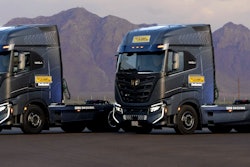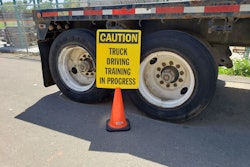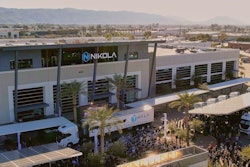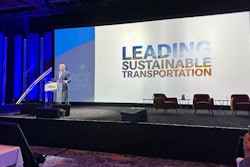Hitting the market in 2025, the recently announced Kenworth T680 FCEV is the culmination of seven years that Kenworth has been collaborating with Toyota on prototype vehicles.
It combines Toyota's second generation hydrogen fuel cell stack with the T680 Next Gen. The T680 FCEV is a Class 8 tractor rated up to 82,000 pounds and stores 60 kilograms of hydrogen on board that powers a 310 kilowatt motor and it's 415 horsepower gives you all the power you need to do your regional or long haul driving. The range is 450 miles and can refuel it in 20 to 30 minutes.
In this video
00:00 Kenworth T680 FCEV
00:43 Toyota hydrogen fuel cell
01:13 Range and refuel time
01:55 Infrastructure for hydrogen fuel cell
02:24 Incentive programs
Here's everything you need to know about the Kenworth T680 fuel cell electric vehicle. This video is filmed at the Advanced Clean Transportation Expo. For more coverage from this show, make sure to subscribe and click the notification bell so you don't miss another video.
I'm Sean Henebry. I'm Powertrain Marketing Manager at Kenworth, dealing with all these great zero mission trucks, such as the one behind me. The freshly announced T680 FCEV. This is really the culmination of seven years that we've been collaborating with Toyota on prototype vehicles, and this is the one that we'll be taking to market in 2025. It combines Toyota's gen two fuel cell stack with the T680 next gen, the world's best truck. It stores 60 kilograms of hydrogen on board. That gets converted to electricity through that fuel cell stack. Powers a 310 kilowatt motor and gives you all the power you need to do your regional or long haul driving.
It's a 415 horsepower. 310 kilowatt is the motor rating. It's rated up to 82,000 pounds, so Class 8 tractor. Range for this is 450 miles and you can refuel it in 20 to 30 minutes, so that makes it a little bit more similar to the diesel drive cycle that you're used to.
We're just so excited to finally announce that we are production-ready for this in 2025. I think right now it's a perfect truck for regional haul, distribution center to distribution center, and then it really has the ability to do the job for a long line haul trucking. It's just whether the infrastructure's there to support that going out that far. So for now, I think it's more of a out and back until the infrastructure's along all the freeways, and then it can go as far as we have hydrogen gas for it.
So as part of the shortest store program, we had 10 pilot trucks and Shell built three heavy-duty fueling stations for us. That was a huge help. But we're just really staying in close coordination with all of the fuel providers and understanding where they see their first deployment in heavy-duty stations. And then we will line our production schedule to map that out and match it and make sure that we're deploying trucks where there is fuel available for the drivers.
We have a grant incentive, experts on staff to really identify all of those federal and state incentives and make sure that you can bring down that top purchase price and make the TCO work comparable to what you would see with diesel.
So in terms of total cost of ownership, fuel's one thing, and we're just kind of waiting to see what that'll look like for your operation. But in terms of maintenance, you're going to fall somewhere in between the battery electric side and your diesel spectrum. Battery electric, there's not a whole lot in terms of routine maintenance. Diesel, there's a bit more. This one, you'll change some filters and things like that, but it's somewhere in between.
A lot of people ask me what's going to win out? Hydrogen or battery electric? And I think they're actually complimentary. If we see a route that is under 200 miles and they're not necessarily weight sensitive or they have time to charge overnight, then we think battery electric is a great solution for them. Really cut down on the maintenance and the total TCO would probably be less expensive than the hydrogen fuel cell. But if weight is a concern to you, if you need that extended range or if you're slip-seeding and you need turnaround time quickly, then the hydrogen fuel cell might be a better technology choice for you for that specific application.
For the latest in clean transportation, subscribe to our daily newsletter by clicking the link below.











